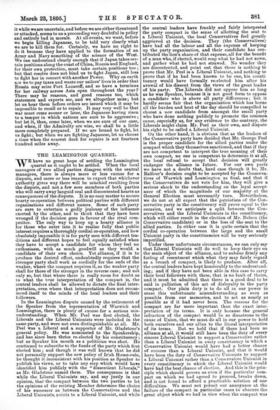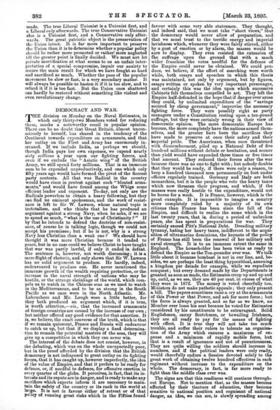THE LEAMINGTON QUARREL.
WE have no great hope of settling the Leamington quarrel as it ought to be settled. When the local managers of two allied parties disagree with the central managers, there is always more or less excuse for a dispute, and more or less reason to expect that whichever authority gives way there will be mischief resulting from the dispute, and not a few sore members of both parties who will carry away languid zeal and discontented hearts as consequences of the dispute. It is no easy matter to secure hearty co-operation between political parties with different organisations and different names. Some of each party are sure to entertain a godly jealousy of the influence exerted by the other, and to think that they have been wronged if the decision goes in favour of the rival com- petitor. The only way to keep up a hearty alliance is for those who enter into it to realise fully that public interest requires a thoroughly cordial co-operation, and how absolutely impossible it is for party men with different tra- ditions and different hopes to feel equally satisfied when they have to accept a candidate for whom they feel no enthusiasm, with as much goodwill as they would. a candidate of their own choice. Yet alliance, if it is to produce the desired effect, undoubtedly requires that the stronger party shall work as cordially for the ends of the weaker, where the compact requires it, as the weaker party shall for those of the stronger in the reverse case; and not only so, but that where there is really room for doubt as to what the true interpretation of the compact is, the central leaders shall be allowed to dictate the final inter- pretation, even where that interpretation does not recom- mend itself to the minds of the local leaders and their followers.
In the Leamington dispute caused by the retirement of the Speaker from the representation of Warwick and Leamington, there is plenty of excuse for a serious mis- understanding. When Mr. Peel was first elected, the Liberals and the Liberal Unionists were included in the same party, and were not even distinguishable at all. Mr. Peel was a Liberal and a supporter of Mr. Gladstone's general policy. He was nominated to the Speakership, and has since been thrice re-elected by his constituency ; but as Speaker his mouth as a politician was shut. He continued to subscribe to the funds of the party which first elected him ; and though it was well known that he did not personally support the new policy of Irish Home-rule, he thought it inconsistent with his position as Speaker to publish his views, or to take any step which would have identified him publicly with the "dissentient Liberals," as Mr. Gladstone named them. The consequence is that while the Liberal Unionists say, and say justly in our opinion, that the compact between the two parties to let the opinions of the retiring Member determine the choice of his successor as between the Conservatives and the Liberal Unionists, points to a Liberal Unionist, and while the central leaders have frankly and fairly interpreted the party compact in the sense of allotting the seat to a Liberal Unionist, the local Conservatives feel greatly aggrieved at the decision. They (the Conservatives) have had all the labour and all the expense of keeping up the party organisation, and their candidate has con- tributed the lion's share of that expense, all for the benefit of a man who, if elected, would reap what he had not sown, and gather what he had not strawed. No wonder they are discontented, and point out that there is nothing to prove that Mr. Peel is a Liberal Unionist, and nothing to prove that if he had been known to be one, his consti- tuency would have formally re-elected him after his avowal of his dissent from the views of the great leader of his party. The .Liberals did not oppose him so long as he was Speaker, because it is not good form to oppose a candidate who is above all party differences ; but it hardly seems fair that the organisation which has borne all the burden and heat of the day should be compelled to choose a new candidate from amongst the small party who have done nothing publicly to promote the common cause, especially as, for any evidence to the contrary, the Liberals might claim Mr. Peel as their own, and dispute his right to be called a Liberal Unionist.
On the other hand, it is obvious that as the leaders of the Conservative party have decided that Mr. George Peel is the proper candidate for the allied parties under the compact which they themselves sanctioned, and that if they are not competent to interpret the true meaning of their own compact, no one is competent to determine it at all, the local refusal to accept that decision will greatly endanger the alliance in future. For our own parts we have not a doubt that, hard case though it be, Mr. Balfour's decision ought to be accepted by the Conserva- tives of Warwick and Leamington as final, and that if the Conservatives do not vote for him, they will give a serious shock to the understanding on the loyal accept- ance of which the magnitude of our majority at the General Election must necessarily turn. Nevertheless, we do not at all expect that the patriotism of the Con- servative party in the constituency will prove equal to the occasion, and we anticipate a split between the Con- servatives and the Liberal Unionists in the constituency, which will either result in the election of Mr. Nelson (the Conservative candidate) or in the loss of the seat to the allied parties. In either case it is quite certain that the cordial co-operation between the large and the small Unionist party in the constituencies will be very seriously imperilled.
Under these unfortunate circumstances, we can only say that Liberal Unionists will do well to keep their eye on the main object of the affiance, and to subdue firmly any feeling of resentment which what they may fairly regard as a breach of compact, is likely to produce. After all, the central leaders have kept honourably to the understand- ing; and if they have not been able in this case to carry their local followers with them, that is no fault of theirs, and it must be admitted that there is a good deal to be said in palliation of this act of disloyalty to the party compact. Our plain duty is to do all in our power to erase this unfortunate misunderstanding as soon as possible from our memories, and to act as nearly as possible as if it had never been. The reasons for the compact are far more important than the exact inter- pretation of its terms. It is only because the general infraction of the compact would be so disastrous to the cause of Union, that we must do all in our power to hold both ourselves and our allies to the literal interpretation of its terms. But we hold that if there had been no alliance at all, it would still have been the duty of every sincere Liberal Unionist to support a Conservative rather than a Liberal Unionist in every constituency in which a Conservative Unionist would have had a better chance of success than a Liberal Unionist, and that it would have been the duty of Conservative Unionists to support a Liberal Unionist rather than a Conservative Unionist in every constituency in which the Liberal Unionist would have had the best chance of election. And this is the prin- ciple which should govern us even if the particular com- pact on which we had agreed to proceed, breaks down, and is not found to afford a practicable solution of our difficulties. We must not permit our annoyance at the failure of the compact in particular cases to obscure the great object which we had in view when the compact was made. The true Liberal Unionist is a Unionist first, and a Liberal only afterwards. The true Conservative Unionist also is a Unionist first, and a Conservative only after- wards. The great patriotic object is the preservation of the Union intact. It is far more important to preserve the -Union than it is to determine whether a popular policy should be rather more promoted or rather', more neglected tifl the greater point is finally decided. We must not let 1)1h-rate mortification at what seems to us an unfair inter- pretation of a special compromise, impair our anxiety to secure the main result for which we have fought so hard and sacrificed so much. Whether the pace of the popular movement be slow or fast, is a very secondary matter. It will always be possible to hasten it if it is too slow, and to retard it if it is too fast. But the Union once shattered can hardly be restored without something like violent and even revolutionary change.







































 Previous page
Previous page